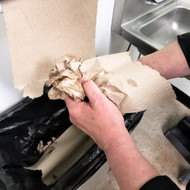Unrolling Sustainability: Comparing Paper Towels and Electric Dryers for Greener Hand Drying
Jun 20th 2023
Recently, we discussed our use of automatic faucets to reduce water waste when washing our hands. A significant amount of potable water can easily be saved, and inexpensive solutions are available for a business or at home. Diving deep into handwashing did, however, raise questions about the impacts made by how we choose to dry our wet hands. Today we look at the difference between paper towels and electric hand dryers in terms of hygiene, efficiency, and environmental impact.
As a manufacturer of baked goods, our facility’s cleanliness is a top priority. From a hygiene standpoint, we believe that paper towels are more effective than electric air dryers when proper handwashing techniques are used. We found a pool of articles included in a study by the Mayo Clinic that includes lab-based research to support this viewpoint.
One article “assessed changes in the number of bacteria on the hands before and after the use of paper towels, a hot air dryer, or a jet air dryer. Finger pads were sampled by contact plates, and the palms were sampled by swabbing and inoculation of agar plates. They found that paper towels reduced the numbers of all types of bacteria on the hands. However, the hot air dryer increased all types of bacteria on the hands. The jet air dryer also increased most types of bacteria, but the increases were less than with the hot air dryer.”
Paper towels also cause less contamination around the sink area compared to hot air dryers. Another article in the Mayo Clinic Study compared bacterial dispersal caused by these two methods. “The dispersal of bacteria by hot air dryers was found within a radius of approximately 3 ft from hot air dryers and to the investigator's laboratory coat. When paper towels were used for hand drying, no dispersal of bacteria was found.”
As we mentioned in our blog on automatic faucets and handwashing, our employees will wash their hands about 10 times a day. While hygiene truly is the most important factor for us when considering different hand drying methods, we also have found that using paper towels is a time saver.
Again, we reference the Mayo Clinic Study to compare the time efficiency of paper towels and hot air dryers.
The results showed that residual water was more efficiently removed from the hands by paper towels. After 10 seconds of drying, residual water on the hands was reduced to 4%. After 15 seconds of drying, residual water reduced to 1%. The hot air dryers took 45 seconds to reduce the residual water to 3%. For us, an extra 30 seconds or so when drying your hands each time would total 5 minutes more per day compared to using paper towels for each staff member. Considering that at any wash station we could only have one or two hand dryers, that method would also lead to an even longer wait for everyone when we are starting the day together or returning from lunch as a group. Focusing on time efficiencies like this makes a difference as companies look to offset increased costs associated with more sustainable choices.
Let’s turn now to environmental impact. Although paper towels are made from trees, sustainable options exist by looking to companies who have responsible forestry practices, replant trees, and use recycled material. As of this writing, we are and have long been using TORK brand RK8002 paper towels. They are made with 100% recycled fiber and carry both Green Seal Certification and UL Ecologo Certification which certify the product for reduced environmental impact.
Looking to electric hand dryers, in addition to the power needed to run them, they can require ongoing maintenance and eventually disposal at the end of each machine’s life cycle. This leads to additional waste and other environmental implications.
So we have learned that paper towels are the most sanitary way to dry wet hands, and that by choosing a thoughtful paper towel source, we are making the most sustainable choice for drying our hands. Some paper towels are made with 100% recycled fiber and have a reduced environmental impact. It’s an easy choice to incorporate Sustainability – one day at a time - into the workplace.
But there’s one final step in the handwashing process: the disposing of the paper towels. Stay tuned as we explore the waste management aspect of paper towels. HINT – our paper towels may be compostable after using them to dry our hands. You’ll learn more about this in a series of upcoming blogs on food waste and how we work to reduce it and manage it.

